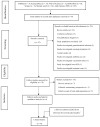Probiotics for the Prevention of Acute Respiratory-Tract Infections in Older People: Systematic Review
- PMID: 34200435
- PMCID: PMC8228160
- DOI: 10.3390/healthcare9060690
Probiotics for the Prevention of Acute Respiratory-Tract Infections in Older People: Systematic Review
Abstract
The aim of this systematic review was to present the indirect influence of probiotics on the incidence and duration of acute upper respiratory-tract infections in older people, by regulating the immune system. Eight randomized, placebo-controlled clinical trials met the inclusion criteria, considering the threshold of older people being 60 years and over. Single strain probiotics were used in all studies, including three probiotic strains used in fermented foods: Lactobacillus delbrueckii subsp. bulgaricus OLL1073R-1, Lacticaseibacillus paracasei subsp. paracasei CNCM I-1518 and Lacticaseibacillusparacasei Shirota, and three probiotic strains used as food supplements: Loigolactobacillus coryniformis K8 CECT5711, Bacillus subtilis CU1 and Lacticaseibacillus rhamnosus GG. Current evidence showed that certain probiotic strains were better than a placebo in lowering the incidence or number of older people experiencing acute upper respiratory tract infections; however, not all probiotic strains were efficient, and not all studies reported statistically significant outcomes. More high quality large-scale properly controlled clinical studies focusing on older people are warranted.
Keywords: fermented foods; older people; probiotics; upper respiratory tract infections.
Conflict of interest statement
The authors declare no conflict of interest.
Figures
References
-
- Hill C., Guarner F., Reid G., Gibson G.R., Merenstein D.J., Pot B., Morelli L., Berni Canani R., Flint H.J., Salminnen S., et al. The International Scientific Association for Probiotics and Prebiotics consensus statement on the scope and appropriate use of the term probiotic. Nat. Rev. Gastroenterol. Hepatol. 2014;11:506–514. doi: 10.1038/nrgastro.2014.66. - DOI - PubMed
-
- FAO/WHO . Health and Nutritional Properties of Probiotics in Food including Powder Milk with Live Lactic Acid Bacteria. Food and Agriculture Organization of the United Nations, World Health Organization; Cordoba, Argentina: 2001.
-
- FAO/WHO . Guidelines for the Evaluation of Probiotics in Food. Food and Agriculture Organization of the United Nations, World Health Organization; London, ON, Canada: 2002. Report of a Joint FAO/WHO Working Group on Drafting Guidelines for the Evaluation of Probiotics in Food.
-
- Zheng J., Wittouck S., Salvetti E., Franz C.M.A.P., Harris H.M.B., Mattarelli P., O’Toole P.W., Pot B., Vandamme P., Walter J., et al. A taxonomic note on the genus Lactobacillus: Description of 23 novel genera, emended description of the genus Lactobacillus Beijerinck 1901, and union of Lactobacillaceae and Leuconostocaceae. Int. J. Syst. Evol. Microbiol. 2020;70:2782–2858. doi: 10.1099/ijsem.0.004107. - DOI - PubMed
Publication types
LinkOut - more resources
Full Text Sources
Molecular Biology Databases
Research Materials
Miscellaneous


